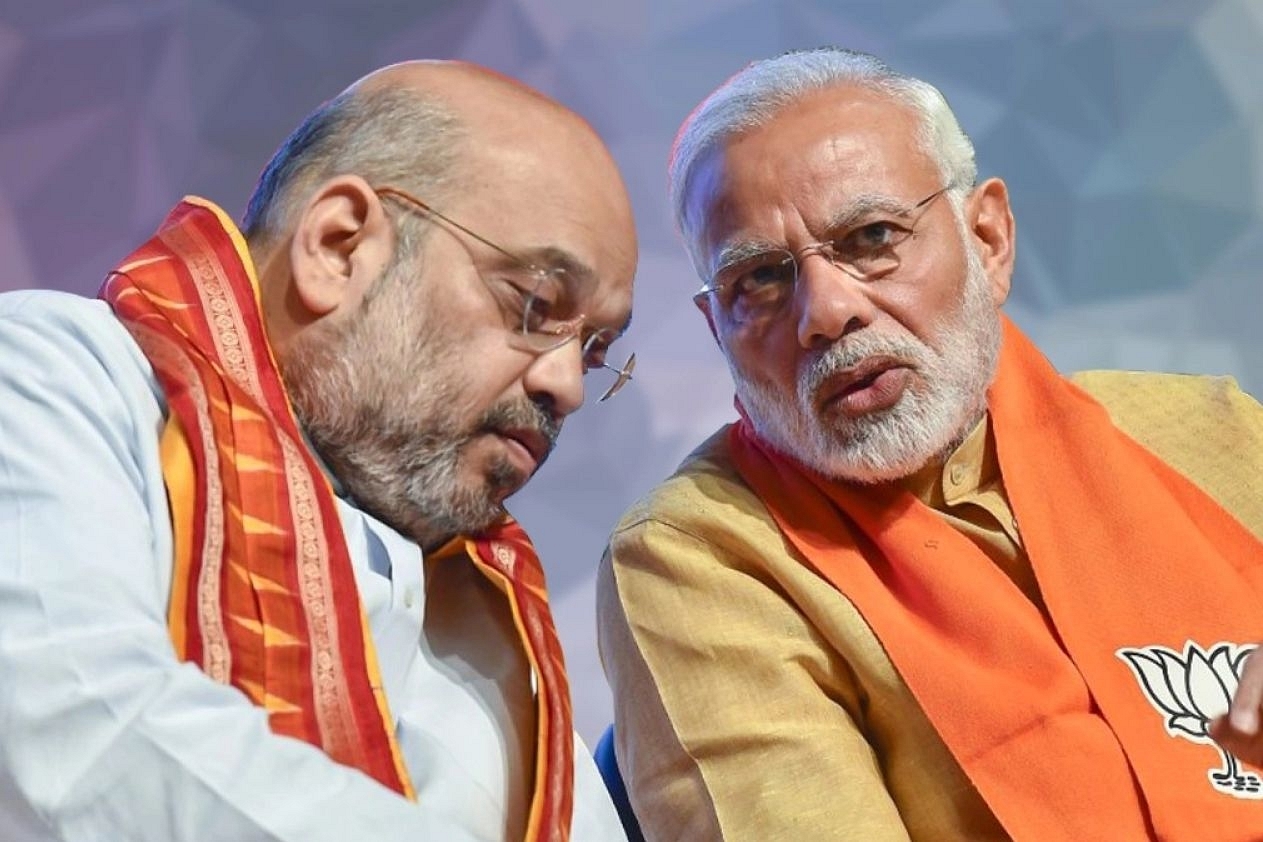Politics
Message To Modi-Shah From Results: Decentralise, Decentralise, Decentralise
- The future of the Indian polity is state empowerment, which implies that Modi has to strengthen states.
- This implies that in future the party has to decentralise.

Prime Minister Narendra Modi with Home Minister Amit Shah
The Maharashtra and Haryana assembly election results – as seen in mid-morning trends – should lead to a big rethink in the Bharatiya Janata Party (BJP) top leadership comprising Narendra Modi and Amit Shah. The simple message is: state leadership matters. It is not possible for the central leadership to deliver victory after victory on the basis of Modi’s popularity and Shah’s booth-level strategies.
This means the future of the BJP must be balanced by a strong regional leadership, and one cannot be a substitute for the other. The differing fortunes of Devendra Fadnavis and Manohar Lal Khattar in Maharashtra and Haryana is proof that strong regional leadership is key.
The results of many major assembly results since 2014 suggest that the voter is learning to differentiate between who she is voting for in the region as against who she is backing in Delhi.
This trend goes back to 2014 itself. In 2014, the BJP won all the seven Lok Sabha seats in Delhi, but the Aam Aadmi Party trounced it in the assembly elections barely nine months later. The same thing happened in Bihar, where Lalu Prasad and Nitish Kumar kept the BJP out of power in October 2015 after being beaten black and blue in the parliamentary polls. It is another matter that Kumar and Prasad could not stay together for long, but that is another story.
In Gujarat, the BJP came close to losing the assembly – thanks again to weak leadership – till Modi managed to rescue the party by hectic campaigning at the nth hour in 2017. In Punjab, the Congress trounced both the BJP-Akali Dal and the AAP in the same year.
In Karnataka, after denying the BJP a victory in the assembly elections in 2018, the voter gave it a thumping win in the Lok Sabha elections. In Madhya Pradesh, Rajasthan and Chhattisgarh, the voters showed the BJP the door in assembly elections, but in the Lok Sabha they voted overwhelmingly in favour of Modi.
In Odisha, the BJP gained seats (but not a majority of seats) in the Lok Sabha but lost badly in the assembly elections held at the same time. In Telangana, the Telangana Rashtra Samithi won big in the December 2018 assembly elections, but in the Lok Sabha, both the BJP and the Congress made huge gains.
In Maharashtra and Haryana, where the BJP again won big in May 2019, it has clearly lost ground now, especially in the latter state. Haryana remains a Congress-Jat fort, especially in rural areas.
The lessons for the BJP to draw are the following.
One, don’t ignore the need to create a strong state leadership. This suggests that the party will have to balance Modi-Shah loyalists with local leaders with tractions.
Two, the future of the Indian polity is state empowerment. This implies that Modi cannot hope to change India by merely running a strong Centre. He has to strengthen states. This implies that in future the party has to decentralise. A charismatic Modi may be the rare exception who can be more popular than his party.
Three, Modi should work towards changing the constitution to devolve more economic power to the states, which will allow its own state leaders to carve out a position that helps them politically – even if this position differs from that of the central leadership. National parties will usually be at a disadvantage when local issues predominate. The good performance of Sharad Pawar’s Nationalist Congress Party and the Shiv Sena in Maharashtra shows that regional pride matters. The BJP would be foolish to pretend that national issues will always carry the day.
The message for Modi and Shah is simple: decentralise, decentralise, decentralise. Both within the party and in terms of constitutional powers.
Support Swarajya's 50 Ground Reports Project & Sponsor A Story
Every general election Swarajya does a 50 ground reports project.
Aimed only at serious readers and those who appreciate the nuances of political undercurrents, the project provides a sense of India's electoral landscape. As you know, these reports are produced after considerable investment of travel, time and effort on the ground.
This time too we've kicked off the project in style and have covered over 30 constituencies already. If you're someone who appreciates such work and have enjoyed our coverage please consider sponsoring a ground report for just Rs 2999 to Rs 19,999 - it goes a long way in helping us produce more quality reportage.
You can also back this project by becoming a subscriber for as little as Rs 999 - so do click on this links and choose a plan that suits you and back us.
Click below to contribute.
Latest